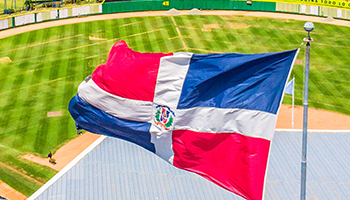Desertification Affects Five Million Dominicans
 | Desertification Affects Five Million Dominicans Some five million Dominicans are affected, directly or indirectly, by desertification, mainly in the Southwest and Northwest provinces and the eastern part of the island, according to the latest studies on desertification in the Dominican Republic. “Desertification is a struggle in contrasts and phenomena such as climate change that produces periods of drought followed by heavy rains that increase vulnerability to natural disasters,” explains Fernandez Mirabal. The process has been broadly examined in the Regional Conference to Fight Against Desertification in Central America and the Caribbean, inaugurated in Barahona by the Secretary of State of the Environment and Natural Resources, Jaime David Fernandez Mirabal, together with the organizations that make up the Inter-Institutional Technical Group (GTI in Spanish), and the regional focal points of the United Nations Convention to Combat Desertification (UNCCD), as part of Earth Day celebrations dedicated to this issue. “Desertification is a struggle in contrasts and phenomena such as climate change that produces periods of drought followed by heavy rains that increase vulnerability to natural disasters,” explains Fernandez Mirabal. He indicated that the way to fight this threat to Haiti and Dominican Republic’s common future is to increase forest cover, which in turn protects water sources for the population. Emphasis is placed on reforestation in the border provinces and the neighboring Haitian communities, through some 17 brigades in the Quisqueya Verde National Plan, which next year plans to employ some 700 people in the border brigades. “The country needs a law that ensures that no less than 20% of the resources that generate the use of water in productive lands return to the watersheds where the rivers originate and invest in reforestation,” he affirmed at the same time he proposed that water reservoirs as well as dams be declared protected areas. Present at the conference were representatives from Honduras, Costa Rica, Panama, Guatemala, Nicaragua, Cuba, Haiti, Spain and Germany; as well as representatives from the German Technical Cooperation (GTZ); the Border Development Board (DGDF in Spanish); the National Meteorological Office; the Promotion Foundation of Azua, San Juan and Elias Pina (FUNDASE in Spanish); provincial environmental directors as well as in the region and non-governmental organizations and civil society organizations. Hans Peter Debelius, GTZ director, states that “the measures and tasks used to fight desertification are similar to those used against climate change, but rather than compete they should be complementary.” The regional fight again desertification supported by the Germany entity in Honduras, the Dominican Republic, and Haiti will end in the next few weeks, at the end of June, but other initiatives will continue in areas such as the Artibonito watershed. The Country’s Situation Desertification, which advances slowly and silently, threatens the capacity of agricultural production, which could be lost, and consequently, the quality of life of the inhabitants. About 70% of Dominican soil is affected by some degree of degradation, according to statistics in the National Action Plan (PAN in Spanish). Of this percentage, 30% of the lands are arid, so they are more fragile and have less resistance, which is the capacity of an ecosystem to recuperate from disasters. Desertification and drought are soil-degrading processes that threaten food production and natural resources. These are caused by climatic variations and human activities, including the expansion of the agricultural frontier into forested areas, deforestation, inadequate use of irrigation systems, contamination of soils by pesticides, nitrates in water bodies, contamination of water with agro-chemicals, slash-and-burn farming, and extensive cattle-grazing. The degradation of the land sets off a series of natural, physical and socioeconomic events with broad-reaching effects, such as flooding, droughts, reduced water sources, loss of biodiversity, change in precipitation patterns, destruction of natural habitats, reduction of agricultural productivity and greater vulnerability to natural disasters. According to information at the conference, which ended 19 June, insufficient irrigation in the Dominican Republic affects soils that provide 40% of the food, as can be seen in the main productive valleys such as Azua, San Juan de la Maguana, Neyva and the Northeast provinces (Dajabon, Valverde, Santiago Rodriguez). Excess water produces an induced salination in soils, which is another type of degradation. “The country needs a law that ensures that no less than 20% of the resources that generate the use of water in productive lands return to the watersheds where the rivers originate and invest in reforestation,” United National Convention to Combat Desertification The United National Convention to Combat Desertification was adopted in Paris on 17 June 1994, and presented for signing in that city o 14 and 15 October 1994. It went into effect on 26 December 1996, ninety days after the 50th ratification. In March 2002, more than 179 countries had signed, and today, 193 on all five continents are members. The Inter-Institutional Technical Group (GT)) is a national coordination body that brings together more than 40 organizations that work with the issue of desertification, either directly or through the organization and institutions that they represent. The actions take place in the framework of the UNCCD. In the implementation of the national action plan, a broad participation of sector-based institutions from the government, nongovernmental organizations, community-based organizations, the private sector, universities, unions, local governments, development councils and watershed councils.
| |
| Date of publication: June 22, 2009 |

Related News
-

(Versión en español) Realizan presentación especial del documental “El Fotógrafo de La 40”, de Erika Santelices y Orlando Barría en Fine Arts Novo-Centro
-

(Versión en español) Grito de Mujer 2024 República Dominicana: El grito interactivo
-

(Versión en español) Star Distribution estrena en cines de México “CANTA Y NO LLORES”, nueva comedia dominicana protagonizada por Consuelo Duval, Michelle Rodríguez y Lumy Lizardo
-

(Versión en español) Museos estatales de SD permanecerán abiertos en Semana Santa para el disfrute familiar
-

Dominicanos en Grandes Ligas
Las ultimas noticias/novedades de lo que acontece con los Dominicanos en las Grandes Ligas durante toda la temporada 2019.


